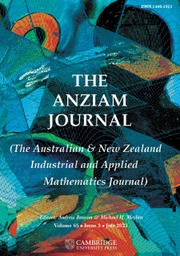Crossref Citations
This article has been cited by the following publications. This list is generated based on data provided by Crossref.
Tuck, E. O.
1983.
Nonlinear extreme ground effect on thin wings of arbitrary aspect ratio.
Journal of Fluid Mechanics,
Vol. 136,
Issue. -1,
p.
73.
Tuck, E. O.
and
Bentwich, M.
1983.
Sliding sheets: lubrication with comparable viscous and inertia forces.
Journal of Fluid Mechanics,
Vol. 135,
Issue. -1,
p.
51.
Forbes, Lawrence K.
1986.
Surface waves of large amplitude beneath an elastic sheet. Part 1. High-order series solution.
Journal of Fluid Mechanics,
Vol. 169,
Issue. -1,
p.
409.
Tan, C.A.
and
Mote, C.D.
1991.
Pressure and flow in fluid films constrained between translating and vibrating flexible surfaces.
International Journal of Engineering Science,
Vol. 29,
Issue. 12,
p.
1609.
Witelski, T. P.
1998.
Dynamics of air bearing sliders.
Physics of Fluids,
Vol. 10,
Issue. 3,
p.
698.
Brevdo, Leonid
and
Il'ichev, Andrej
2001.
Multi-modal destabilization of a floating ice layer by wind stress.
Cold Regions Science and Technology,
Vol. 33,
Issue. 1,
p.
77.
Brevdo, Leonid
2003.
Neutral stability of, and resonances in, a vertically stratified floating ice layer.
European Journal of Mechanics - A/Solids,
Vol. 22,
Issue. 1,
p.
119.
Brevdo, Leonid
and
Il'ichev, Andrej
2006.
Uni-modal destabilization of a visco-elastic floating ice layer by wind stress.
European Journal of Mechanics - A/Solids,
Vol. 25,
Issue. 3,
p.
509.
Il’ichev, A. T.
and
Tomashpolskii, V. Ya.
2015.
Soliton-like structures on a liquid surface under an ice cover.
Theoretical and Mathematical Physics,
Vol. 182,
Issue. 2,
p.
231.
Il'ichev, Andrej Teimurazovich
2015.
Солитоноподобные структуры на поверхности раздела вода-лед.
Успехи математических наук,
Vol. 70,
Issue. 6(426),
p.
85.
Il'ichev, Andrej Teimurazovich
and
Tomashpol'skii, Viktor Yakovlevich
2015.
Солитоноподобные структуры на поверхности жидкости под ледяным покровом.
Теоретическая и математическая физика,
Vol. 182,
Issue. 2,
p.
277.


